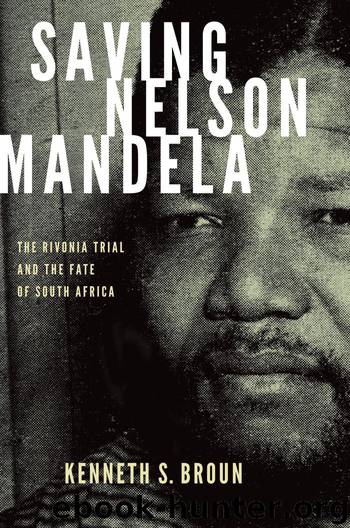Saving Nelson Mandela by Broun Kenneth S

Author:Broun, Kenneth S.
Language: eng
Format: epub
Publisher: Oxford University Press, USA
Published: 2012-04-20T04:00:00+00:00
12
Judgment and Sentencing
ON JUNE 11, 1964, exactly eleven months after the Rivonia raid, the court reconvened to pronounce its judgment. Two thousand black Africans crowded Church Square in front of the Palace of Justice, joined by a small but noisy group of whites, most wearing blazers identifying them as students at the Afrikaans-language University of Pretoria. The blacks carried signs and sang in support of their leaders. The students demonstrated in favor of a conviction and death. Very few of those demonstrating had right of entry to the courtroom; a series of checkpoints controlled access to the courtroom, limiting admission to those associated with the police.
The proceeding itself was astonishingly brief. The audience and counsel were seated. The accused were brought up from the cells below. Judge de Wet entered in his red robes and, in a quiet voice difficult to hear in most of the gallery, read a short statement announcing his ruling on the charges.
All defendants, other than Ahmed Kathrada and Lionel Bernstein, were convicted on all counts. Kathrada was convicted only on count 2, conspiracy to violate the Sabotage Act. Bernstein was found not guilty of all charges and ordered discharged. The judge gave no reasons for his rulings from the bench, but filed a seventy-two-page judgment explaining his decisions. Sentences were to be handed down the next day.1
After the judge left the bench, courtroom decorum gave way to confusion. The accused turned and waved to their families, shouting out the judgment for those who might not have heard the judge’s pronouncement. An elated Hilda Bernstein rushed toward the dock to touch her husband. Rusty Bernstein pushed his way out of the dock, trying at least to reach counsel table. Prison officials restrained him, demanding that he return to the cells down below where “everything would be fixed up.” Knowing he would be rearrested, Bernstein wanted that arrest to take place in open court, with the whole world watching. He got his way. The defendants’ old nemesis, Captain Swanepoel, placed him under arrest under new—and as yet unspecified—charges and ushered him below with the other now-convicted defendants.2 The Sabotage Act specifically negated the defense of double jeopardy.
The accused left the courthouse in the police convoy. As they left, Albertina Sisulu, Walter’s wife, led the crowd in singing the African anthem Nkosi Sikelel’ iAfrica. To the jeers of the University of Pretoria students, the supporters raised their fists in the illegal African National Congress salute and shouted “Amandla.” The convicted returned their salute with their hands thrust through the bars of the van carrying them, responding “Ngawethu.”3
The typewritten judgment contained few surprises.4 The documentary evidence had been overwhelming. Most of the defendants had admitted the critical charges against them. Judge de Wet made short work of the cases against Mandela, Sisulu, and Mbeki. All had effectively admitted guilt of count 2 (conspiracy to violate the Sabotage Act), count 3 (violation of the Suppression of Communism Act), and count 4 (receiving money to commit the offenses set out in the other counts).
Download
This site does not store any files on its server. We only index and link to content provided by other sites. Please contact the content providers to delete copyright contents if any and email us, we'll remove relevant links or contents immediately.
| Africa | Americas |
| Arctic & Antarctica | Asia |
| Australia & Oceania | Europe |
| Middle East | Russia |
| United States | World |
| Ancient Civilizations | Military |
| Historical Study & Educational Resources |
Goodbye Paradise(3795)
Men at Arms by Terry Pratchett(2831)
Tobruk by Peter Fitzsimons(2500)
Borders by unknow(2301)
Arabs by Eugene Rogan(2292)
Pirate Alley by Terry McKnight(2212)
Belonging by Unknown(1854)
More Than Words (Sweet Lady Kisses) by Helen West(1851)
It's Our Turn to Eat by Michela Wrong(1719)
The Biafra Story by Frederick Forsyth(1645)
The Source by James A. Michener(1601)
Botswana--Culture Smart! by Michael Main(1597)
A Winter in Arabia by Freya Stark(1532)
Gandhi by Ramachandra Guha(1525)
Coffee: From Bean to Barista by Robert W. Thurston(1522)
The Falls by Unknown(1519)
Livingstone by Tim Jeal(1478)
The Shield and The Sword by Ernle Bradford(1396)
Africa: Altered States, Ordinary Miracles by Richard Dowden(1376)
